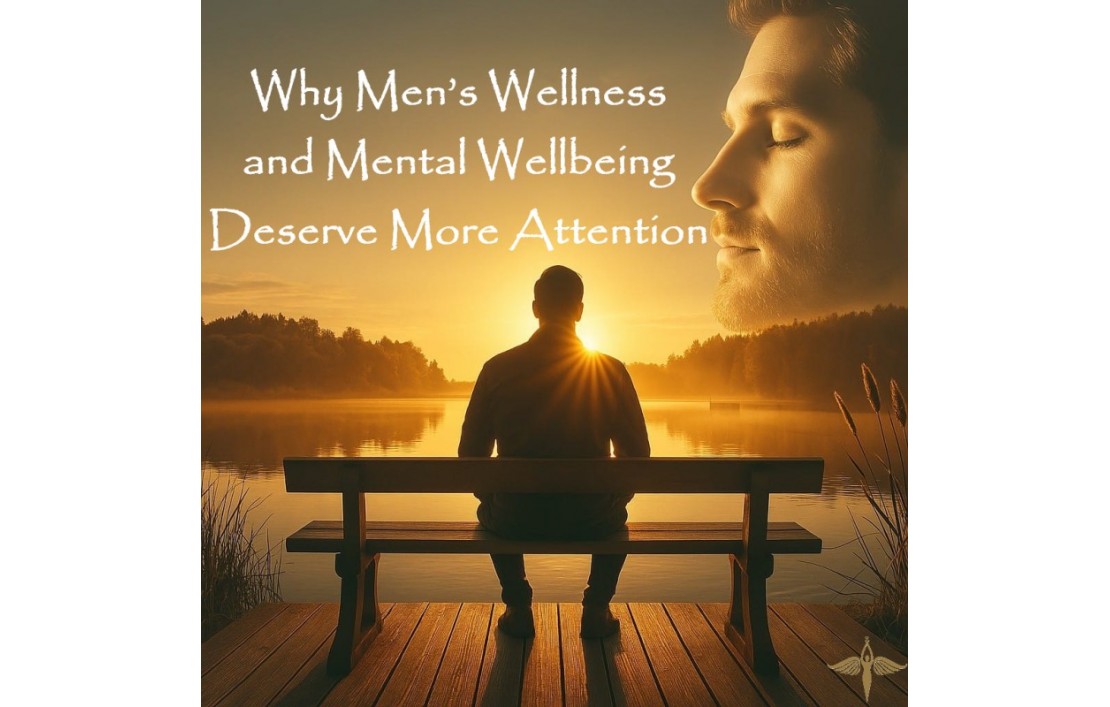
Why Men’s Wellness and Mental Wellbeing Deserve More Attention... And What We Can Do About It
07/04/2025 | Harry Dimitriadis
Key Takeaways
- - Men’s mental wellbeing is as crucial as physical health but often ignored due to stigma.
- - Self-care for men goes beyond gym routines—emotional wellness matters just as much.
- - Society must create safe spaces for conversations about mental health for men.
- - Practical steps and mindfulness practices can significantly improve male mental health.
- - Mental resilience for men is built through community, awareness, and daily habits.
Introduction: Let’s Talk About What’s Not Being Talked About
As a mental health advocate, I’ve spent the better part of a decade listening to the unspoken. The sighs behind the smiles. The “I’m good” that really means “I’m barely holding it together.” And far too often, those words come from men. Fathers, sons, athletes, executives, teens, retirees—you name it. Men from all walks of life struggle in silence.
This blog isn’t just an opinion piece. It’s a conversation we all need to have. Let’s break the stigma, talk openly about men’s wellness, and empower more people to prioritize mental wellbeing for men.
The Silent Crisis: Why Men’s Mental Health Is Often Overlooked
Despite living in an age where mental health is finally getting some of the spotlight it deserves, men’s mental wellbeing remains in the shadows. And it shows—suicide is the leading cause of death among men aged 20-49 in many countries, including the UK and Australia. In the U.S., 79% of all suicide deaths are men.
Why?
Let’s look at some contributing factors:
- - Cultural conditioning: “Be a man,” “Toughen up,” “Don’t cry.” These are messages boys hear from an early age.
- - Fear of judgment: Seeking help is often perceived as weakness.
- - Lack of awareness: Many men don’t even recognize the symptoms of anxiety or depression in themselves.
- - Few outlets: There are fewer safe, non-judgmental spaces for men to express emotional pain.
But mental health for men is not optional. It’s foundational to living a full, healthy, and connected life.
A Personal Story: When I Nearly Lost My Friend
Years ago, a close friend of mine—let’s call him Jake—was the guy everyone looked up to. Fitness enthusiast, hardworking, always cracking jokes. But behind the scenes, he was battling anxiety and burnout.
It wasn’t until he broke down at a coffee shop—after a seemingly normal workday—that he admitted, “I haven’t felt okay in months. I thought I was just tired.”
Jake thought he had to muscle through it. What he needed was an open door, someone who would listen without judgment. Luckily, he got help and is now an advocate for mental resilience for men.
Jake’s story isn’t unique. But that’s exactly why it matters.
Men’s Wellness: It’s More Than Just Hitting the Gym
When we talk about men’s wellness, we often focus on fitness goals, muscle gains, or clean diets. And while physical health is vital, holistic wellness for men also means:
- - Emotional wellbeing for men: Understanding, expressing, and regulating feelings.
- - Mental clarity: Managing stress, anxiety, and negative thought patterns.
- - Spiritual grounding (if applicable): Mindfulness or a deeper sense of purpose.
- - Social connection: Having a support network of people who get it.
The body can be in top shape while the mind is silently crumbling.
The Data Speaks: Mental Health Challenges Men Face
Let’s look at the numbers. These aren’t just statistics—they’re signals.
- - 1 in 8 men experiences depression, and 1 in 5 struggles with anxiety at some point in their lives.
- - Men are less likely than women to seek therapy, even when they know something’s wrong.
- - Substance abuse rates are higher among men, often used as a coping mechanism.
These numbers highlight an urgent need for an increase in men’s mental health awareness and intervention strategies that actually work for men.
From Survival to Strength: Action Steps Toward Mental Wellness for Men
Improving male mental health isn’t just about crisis response. It’s about prevention, habit-building, and everyday tools.
Men’s Mental Wellbeing Checklist:
- - Talk to someone. Friend, coach, therapist—don’t keep it all inside.
- - Schedule daily check-ins. Ask: “How am I feeling emotionally today?”
- - Move your body. Exercise is excellent stress relief for men.
- - Practice mindfulness. 5–10 minutes of breathing, journaling, or meditation.
- - Limit (or eliminate) alcohol and screen time. These often mask deeper issues.
- - Join a group. Whether it’s a men’s circle, sports team, or book club—connect.
- - Sleep better. Prioritize quality sleep—it’s essential for brain health.
- - Consume positive content. Podcasts, books, and media and music that uplift, not drain.
These aren’t cure-alls—but they’re a solid foundation.
Therapy for Men: Yes, It Works. No, It’s Not Weakness.
One of the most transformative tools available today is therapy. Therapy for men is not just about “talking feelings.” It’s about:
- - Processing trauma
- - Managing anger or irritability
- - Navigating fatherhood, work stress, identity
- - Building coping skills for anxiety or depression
And now, there are male-specific therapy models and male therapists who understand the unique challenges men face.
Men’s Mindfulness Practices: More Powerful Than You Think
You don’t need to sit cross-legged in silence for an hour. Men’s mindfulness practices can be:
- - Walking without distractions
- - Breathwork after a workout
- - Journaling frustrations before bed
- - Listening to music and being fully present
Mindfulness helps build mental resilience for men, reduces cortisol levels, and enhances decision-making.
The Role of Community and Culture
We can’t talk about self-care for men without addressing the environments they live in. Culture shapes coping mechanisms.
Parents, teachers, employers, and friends have a huge role in:
- - Encouraging emotional expression
- - Normalising therapy and self-care
- - Modelling healthy emotional regulation
Let’s change the narrative from “man up” to “speak up.”
Perspectives for Every Age Group
Teens & Young Adults:
These years are tough. Identity, relationships, and pressure collide. Teach emotional literacy early. Create spaces where boys can say, “I’m not okay” without shame.
Parents:
Model mental wellness at home. Dads, show your sons that strength includes vulnerability. Moms, keep the doors of conversation open.
Fitness Enthusiasts:
Balance the grind with recovery—emotionally and mentally. A six-pack won’t fix emotional burnout.
Students:
Academic pressure is real. Learn early that asking for help is smart, not weak.
Retirees:
Later years can bring loneliness or purpose-seeking. Community engagement and hobbies are powerful tools for mental health.
Mental Health Advocates:
Keep pushing the dialogue forward. Men need your voice more than ever.
Inspiring Stories: Men Who Spoke Up and Thrived
- - Michael Phelps, Olympic swimmer, openly discussed his depression and now advocates for therapy.
- - Dwayne “The Rock” Johnson shared his battle with anxiety and encourages men to speak up.
- - Prince Harry has openly talked about seeking therapy after his mother’s death, breaking royal tradition and stigma.
These aren’t just celebrities—they’re proof that vulnerability doesn’t make you less of a man. It makes you more human.
Let’s Wrap It Up: Key Takeaways
- 1) Men’s wellness includes physical, emotional, and mental dimensions.
- 2) Mental health for men is a public health issue, not a personal flaw.
- 3) Talking, therapy, mindfulness, and community are proven tools.
- 4) Self-care for men isn’t selfish—it’s survival.
- 5) The change starts with us: friends, family, advocates, and individuals.
Final Thought: We’re Not Meant to Do Life Alone
If you’re a man reading this, I want you to know: You are allowed to hurt. You are allowed to ask for help. You are allowed to be human.
And if you’re someone who cares about a man in your life—reach out. Check in. Hold space. Share this post. Start the conversation.
The path to men’s mental wellbeing begins not with grand gestures but with small, consistent acts of care, courage, and connection.
Now it's your turn.
Because men’s lives depend on it.

